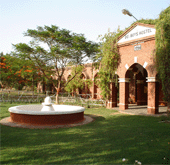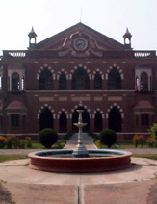
The Institute has introduced a scheme of innovative and comprehensive education at university and non-university general and technical education levels which aims at excellence but not at the cost of the relevance, which inculcates dignity of labour, encourages initiative and creative work, which is multi-disciplinary, which prepares men for the increasingly techno-oriented society of tomorrow without uprooting them from their agricultural moorings, which will generate in the alumni the basic values of humanism, secularism and democracy by exposing them to the principles of all the major religions of the world and to their own cultural heritage, thus developing in them an integrated personality of well-adjusted men whose world has not been broken into fragments by narrow domestic walls.

 |
Soon after Dayalbagh was founded in 1915, the Radhasoami Satsang Sabha, in pursuance of the lofty ideals to evolve the superman of tomorrow, started the Radhasoami Educational Institute, as a co-educational Middle School, open to all, on January 1, 1917. Administered by a Managing Committee registered under the Societies Registration Act XXI of 1860, the Institute, since the very beginning, combined the pursuit of academic studies with sensibilities, moral and spiritual values. From the modest beginning, the nucleus not only grew and got divided but also spawned new institutions, as the needs of the society and the times demanded. Within six months, it was raised to the level of a High School; Intermediate classes were started in 1922; it became a Degree College in 1947, with the introduction of B.Com. classes affiliated to Agra University; B.Ed. (B.T.) classes were added in 1951 and the first batch of B.Sc. students was sent up for the final examination in 1955. A Technical School, which later developed into a College, was started in 1927 for imparting training in automobile, electrical and mechanical engineering, leading to the award of diploma in the concerned branch of the Board of Technical Education, U.P. The Leather Working School, started in 1930, gives instructions in both theory and practice for manufacture of leather goods. To further the cause of women's education, Prem Vidyalaya was started in 1930. It is now an Intermediate College. The Women's Training College was established in 1947 for B.A. and B.Ed. classes. M.Ed. classes were added in 1958. M.A. in Psychology, English and Hindi in 1969 and M.A. (Music) in 1976. It made phenomenal progress to become one of the premier women's colleges in the country.Engineering College, affiliated to Agra University, for the degree of B.Sc. (Engineering), was the latest (1950) addition to the chain of educational institutions in Dayalbagh. |
In 1975, it formulated an innovative and comprehensive programme of undergraduate studies which received approbation from the Government of Uttar Pradesh and the University Grants Commission, as a result of which in 1981 the Ministry of Education, Government of India, conferred the status of an institution deemed to be a University on the Dayalbagh Educational Institute, to implement the new scheme.
Location and The Neighbourhood CommunityThe Institute is situated at DAYALBAGH, a self-contained colony well-known for its serene environment, secular establishments like the industries, the educational institutions, the agriculture farm etc. and the activities of its inmates who lead an active, disciplined and co-operative community life, conforming to the high spiritual ideals of their faith. It is situated at a distance of about two Km. from the city of Agra on its northern periphery. It is conveniently connected to the railway stations and bus-stands by the city bus, rickshaws, auto-rickshaws and taxies. |
|
Vision 2011
Dayalbagh Educational Institute has set forth a bold goal for itself: to become one of the top 20 educational institutions in the country by the year 2011. Keeping in line with the original philosophy of education at Dayalbagh, this goal set forth for the institute envisions making D.E.I. a top teaching-cum-research institute, leading others forward with the exemplary system of education that integrates (K-U) i.e. K through 12 through UG/PG to Ph.D. programmes. Education at DEI will reflect a rare combination of state-of-the-art knowledge woven into a fabric that inculcates dignity of labour, and stresses creative multi-disciplinary work experience, cultural and agricultural moorings, and basic values of humanism, secularism and democracy. In fact, Vision 2011 envisages that a major spin-off of DEI's effort to move into the top 20 institutions in India will be its recognition at international fronts for its excellence in instruction and research, within its special social, moral, and spiritual framework.
